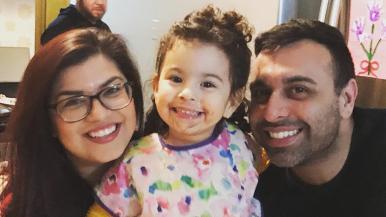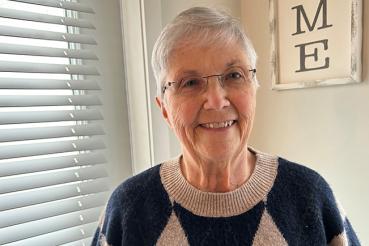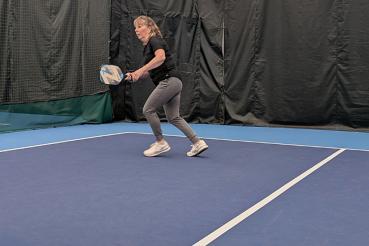When I was 23 weeks pregnant, I began to have slight stomach pain, and after a 24-hour period, decided to have it checked out to put my mind at ease. When my husband Julian and I arrived at Rush, we casually walked up to the front desk in the labor and delivery department. I don't remember much except for the fact that I gripped the counter hard to support myself standing. A nurse poked her head out of a hallway and without missing a beat said, “Oh honey, you're in labor."
That began the very swift journey to parenthood over the next week. Julian and I didn't understand at that very moment the weight that would be placed on our hearts in the near future. We were innocently ignorant. I hadn't even packed a bag. I'd never felt her kick. My belly never got to grow so big that I couldn't tie my shoes. The paint was barely dry on her nursery walls.
Doctors came in to see us and explain what we were facing. Nothing seemed emergent to me until Julian quietly asked if we should call our parents. I remember the nurse softly nodding her head and apologizing through her eyes.
Everything hurt. Panic, sorrow and anxiety crept in. My first feeling as a mother was guilt. I went through my actions over the last 23 weeks to single out what I could have done to cause my own body to do this to my baby — my poor husband's baby. I alone was her safe place, and I was doing her more harm than good. I don't remember much of those conversations with doctors. I do remember having to make life altering choices in a short amount of time.
Prepared to fight
In between doctors coming in and out, I remember asking Julian if we were making the right decisions. He didn't know either. I remember being able to muscle through the day, so grateful to the nurses, who were always glad to indulge me in conversation when I sought it out. They stayed true to Maslow's hierarchy, noting my need for comfort outside of all of the other physiological needs. At night, I was filled with visceral fear of facing reality, just my baby and I, to whom I must have said “I'm sorry" to more times than I've ever said in a lifetime.
There was a plan in place to keep me in bed for the next 15 weeks. If they would have told me to hang upside down like a bat for the next 15 weeks, I would have. I was prepared to fight to keep her in despite my body's efforts, or lack thereof. Julian, weeks into the probationary period at his new job with the city, stayed with me, even though home was less than a mile away. He got the least amount of sleep between the both of us. He would scrunch up on the couch in the room, go to work at 4:30 a.m., race home and ready himself for the next workday, and race back to the hospital to scrunch himself on the couch next to me again. Sometimes I felt like he needed more support than I did, as I watched him watch me, helplessly.
Months in the NICU
A week into our 15-week stay, my body couldn't hold her in any longer. I'd failed her, yet again, despite all the medical interventions. Everything moved quickly. The instruments' table was prepped, the brighter-than-football-field lights flipped on, the medical students solemnly filed in, and then the NICU team filed in. I remember covering my face with my blanket out of embarrassment, sadness, and as a way to gather myself for the next part of my life. Controlled chaos ensued with my third push as my child came out — lifeless.
I remember looking at my husband's face for reassurance, as I couldn't see her from my position. He sobbed, but kept his eyes on her. He wouldn't look at me.
There was a terrifying silence. Three whole minutes of silence. No sounds of my baby crying, no “Hey, welcome to the world!" and — understandably, no one asking if we wanted first photos; just thick, heavy, determined silence.
Finally, I heard, “got it." The first news of my baby was that she was successfully intubated and would be rushed over to the NICU, where I could join her after recovery. She weighed only 710 grams — about a pound and a half.
'Home' at Rush
The next four months in the NICU were filled with worry, joy, hope, sadness, anger — everything. I remember so much, but so little. It may be a defense mechanism, but I feel like my brain softened the worst parts and held on to memories of the happy parts of our stay in the NICU.
I remember the sterile smell and feeling of discomfort when we first got there. I remember feeling terrified of being estranged from my daughter. More clearly, however, I remember realizing the feeling of home the NICU brought. Home wasn't our condo anymore. Home was our little room on the eighth floor in the Tower, where Noelle was for so long.
I left my job, and as the world spun around us, I stood still for Ellie. I remembered a quote from Galileo, “The sun, with all those planets revolving around it and dependent on it, can still ripen a bunch of grapes as if it had nothing else in the universe to do." I still think about that. I don't know how productive I actually was outside of the NICU, but I put all of my energy into growing my little human while trying to function outside of the NICU.
I was there every morning for rounds. I made a binder to scribble down information I'd gathered, and information I would later look up to better understand. I bought a book about preemies to learn as much as I could about my baby. I learned how to pump milk. I bought tons of blankets for her isolette [crib]. I decorated her door as creatively as I could. I did everything in my power to give her the best possible environment outside of my body, as best as I could.
Home became the nurses I'd grown to know and trust more than myself with my baby. Home was hard to leave when Noelle was strong enough to be just a normal, room air breathing, wireless infant. I'll always be grateful to the NICU and the NICU team for the effort that it took to save my daughter, my husband and myself.
'Perfectly healthy'
Noelle, who was given that name at birth, but goes by Ellie normally, is finishing up her year in pre-K. She's perfectly healthy, growing and super inquisitive. She has no intellectual or physical disabilities. She is fortunate to have no hearing or vision loss, and no presence of chronic lung disease, given how early she was.
She makes us laugh. She's quick to respond with something witty. Ellie is now seeing the world around her through words. She determined she would learn how to read, and the era of spelling out words we'd like to go over her head have come to an end. I can rightfully say that she's still as impatient as she was the day that I met her.
We have an inherently sweet girl. She's always the first to offer help, she reminds us to be patient, and she is unwaveringly kind. When asked what she wants to be when she grows up, she responded, “I'm going to be a mommy, a baby doctor and scientist. Oh, and I want to work next to you."
March for Babies
I encourage everyone to support this year's March for Babies. When I think of what March of Dimes stands for, I look at the awareness it raises, which leads to education and resources provided to reduce the toll that prematurity takes on families. The March of Dimes grants facilitate research that lays the groundwork for evidence-based practices used in NICUs today. I appreciate that March of Dimes has chosen to highlight socio-economic disparities that play a major role in specific demographics, mainly underserved communities, and their link to prematurity.
I think that their work to bring these issues to light, while they may not directly affect my family, are vital in achieving equity that is critical to our society as a whole. You can support Ellie's March for Babies team here.
Rush University Medical Center and the March of Dimes have long been partners in the fight for health equity of all moms and babies. This year, we will again support the March for Babies, the March of Dimes' largest fundraiser, which will be held as a virtual experience on Sunday, April 25.
The March of Dimes plays a huge role in helping our neonatal intensive care unit staff provide support to families with babies born prematurely. Every baby in the NICU has benefited from the March of Dimes through its support of research, NICU technology and advancement of prenatal care. This year, the March of Dimes started its COVID-19 Intervention and Support Fund to address the urgent need for research to protect moms and babies from COVID-19.




